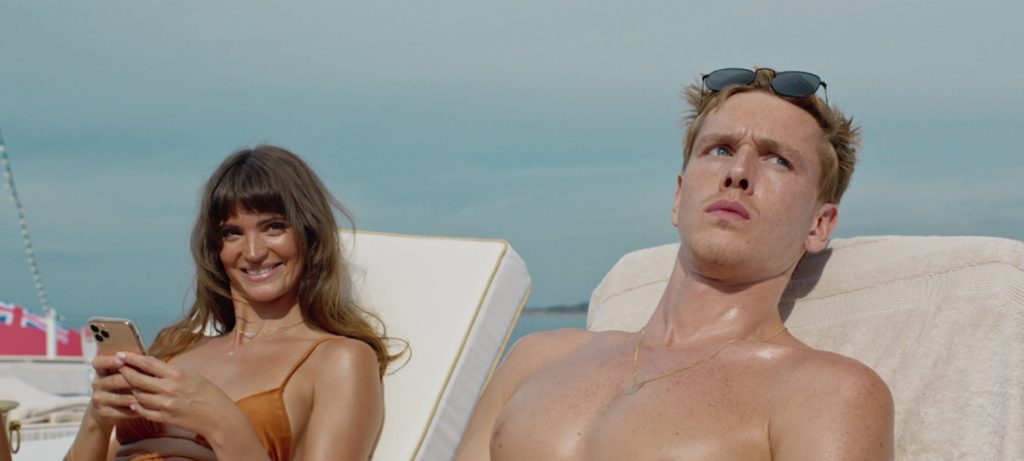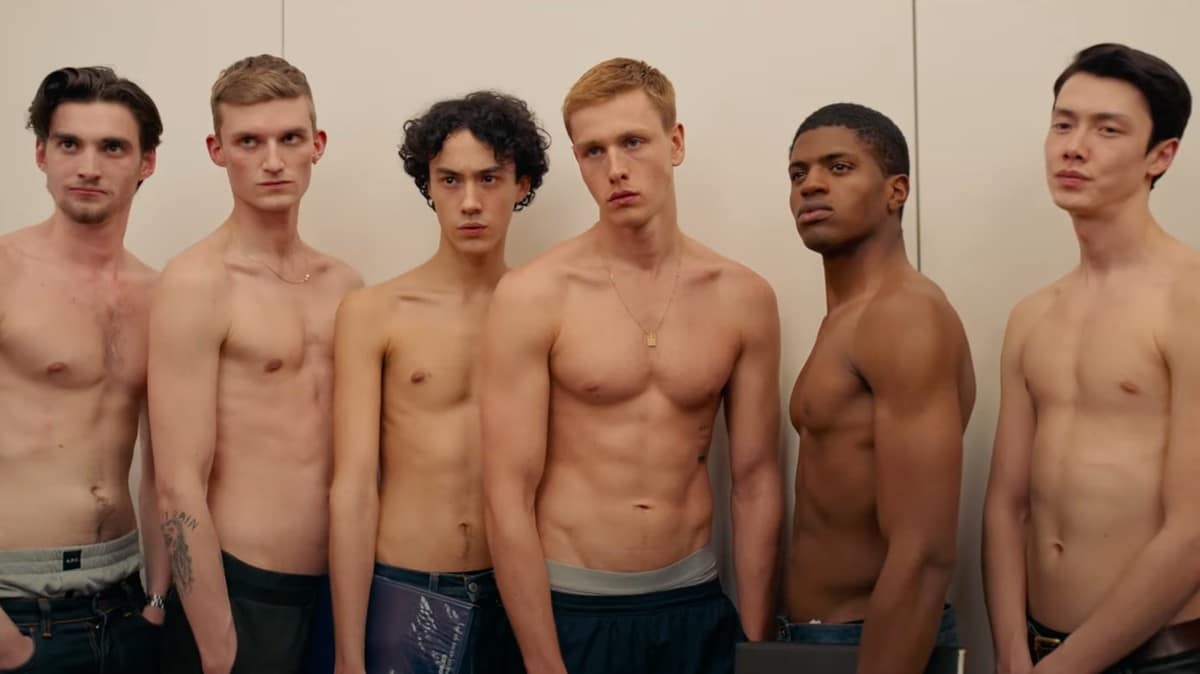
If Triangle of Sadness (2022) could be rendered down to one message, it’s this: society’s new ‘aspirational’ goals are just as likely to come crashing down as everything else. The film offers up a world of floating wealth, glamour, vanity and privilege, calls the whole shebang into question and then glories in pulling it down. The resulting film is very, very funny and (usually) trusts the audience to get what it’s doing without shepherding them towards The Point. But it’s also a surprisingly dark film, which hammers its daft but essentially harmless protagonists into the sand in ways which can be as gruelling as they are engrossing. It offers a very well-observed causal link between farce and social commentary, hinting at the oh-so plausible idea that they’re often one and the same, given the society in question.
Carl (Harris Dickinson) is a male model: he’s had some moderate success in the industry, judging by his portfolio, but we’re shown in no uncertain terms that his job is, well, a bit silly. Parading around shirtless with a host of other young men distinguishable only by their ethnicity – the height, the hairlessness, the pout are all the same – he’s trying to get a gig where he has to showcase a certain kind of facial expression, as well as such tasks as – walking in a line. ‘Get rid of your triangle of sadness’, one of the panel suggests, meaning the frown lines around his brow. It’s good advice in terms of getting hired (which he doesn’t seem to be on this occasion) and also tough advice which he struggles to follow throughout the film, given the scenarios which unfold around him. Through it all, Carl has the vibe of a man who doesn’t quite know what’s going on, and can only trade in his good looks, because nothing else is exactly certain.
That being said, his good looks get him places, sure, but don’t immure him from being exploited and dismissed. Girlfriend Yaya (Charlbi Dean) is also in fashion – well, sort of, as an Influencer – and she has perfected the art of never seeing an unpaid restaurant tab; Carl has a go at railing against this, but they make it up of course. Theirs is chiefly an Instagram marriage of convenience, a relationship being conducted to get followers and to sell a lifestyle. Carl’s blithe confidence that Yaya will really fall for him one day seems to underestimate her as-yet untested commitment to the two-dimensional. For her, it’s a business thing, but she’s confident enough to peek out from behind this at times, knowing that even her complete honesty about her motivations won’t break this at-times very lucrative bond.
It’s a bond which gets them tickets aboard a very exclusive yacht trip. Not too shabby, given Yaya’s credit card was recently declined, but that seems to be the wages of Influencing – the ability to go somewhere nice for free, to do more of it. The rich and privileged aboard – a disparate bunch, but most of the older travellers seem to have made their fortunes actually doing something, even if you don’t like what that something is – are there to play, sit at the captain’s table, and occasionally acknowledge the crack team of staff hellbent on serving their every whim. Boss of the middle layer of humans, Paula (Vicky Berlin) takes these responsibilities very, very seriously, though she’s openly motivated by the promise of tips and praise nonetheless. But it’s worth remembering that the ship isn’t divided into two – masters and servants, to put it crudely. There’s another social class here, and one which goes largely unseen until their presence becomes very noteworthy indeed. The Filipino crew members – tending the engine room, cleaning the loos – are as invisible to those people in crisp white shirts as the crisp white shirt wearers are to the idle (if retired) wealthy above deck. It all feels like a very modern microcosm. There’s always someone getting their hands dirty, while another group of people enjoy all the appearance of hard graft on their account.
Things begin to go badly wrong on account of two key factors. First, the captain (Woody Harrelson) won’t leave his quarters, and Paula is horribly suspicious that he’s drinking in there. This could jeopardise the much-vaunted Captain’s Dinner, which is meant to be a highlight of the trip. (It’s also rather charming that, despite being hidden behind a door for much of the film, Harrelson’s character still dominates proceedings; it only takes hearing his voice at first, which is credit to what he does with this role.) Secondly, a storm is about to hit: it’s a hell of a storm, too, and it precipitates one of the funniest, most unexpected segues into physical comedy I’ve seen in a while. (Has anyone seen Taxidermia? Yeah.)
Would that have been enough? This well-executed shift into a more physical disruption of how the good times roll? Actually it would, but as much as director Ruben Östlund takes his time over this element of the plot – there’s more. Add in a captain who would rather fight the system he ends up supporting, a charmingly earthy, rags-to-riches Russian millionaire still very able to roll with the punches, a host of morally dubious but personally completely likeable guests navigating the hellish after-effects of the storm; still there’s more. Triangle of Sadness is not only able to shift its location, but uses this to take more time underlining the almost perfect fecklessness of the Influencer generation, now in an extreme situation. The ruined yacht and then the introduction of yet another outsider agency to question this tenuous class system is pitch perfect, and the final act of the film offers an engaging, perfectly ambiguous conclusion to all of this. It’d be remiss not to mention the character of Abigail (Dolly De Leon) who showcases that fecklessness by comparison, but when she asks her companions if they could catch fish, make a fire, cook – could she not be asking the audience, too? Most of us have more in common with the beachgoers, if we can call them that, than we do with Abigail. Then, at the heart of all this, there’s Carl again: is he being sincere, or is he just using his physical charms to get by – again?
This is a film able to sustain moments of charm and warmth alongside pitch-black humour and grotesque observation. The death of its star, Charlbi Dean – it goes without saying perhaps – is a tragedy: as a genuine former model who brings her insider knowledge of the industry to bear on her performance here, she is perfect, sweet and mean and honest and dishonest by turns. You can – just about – pity Carl, even whilst being eminently frustrated by him, and held apart from him. This is a film which leaves some big questions hanging without compromising on its verve and wit.
Triangle of Sadness (2022) is at cinemas now.
